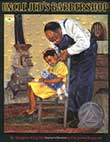Uncle Jed's Barbershop Q&A

Use these questions with children 7 to 10 years old to discuss the following economic concepts in Uncle Jed's Barbershop: bank failure, opportunity cost, saving, savings goal, and segregation.
View all of our Parent Q&A resources.
Teachers: View the lesson plan using Uncle Jed's Barbershop.
Book written by Margaree King Mitchell (ISBN: 978-0-689-81913-7).
Questions:
1. A savings goal is a good or service you want to buy in the future. What was Uncle Jed’s savings goal?
Uncle Jed wanted to open a barbershop.
2. Saving is keeping some income to buy things in the future. Name some of the “fancy equipment” Uncle Jed wanted to buy for his barbershop?
Shiny sinks, four barber chairs, and a big, tall, red-and-white barber pole
3. The book says most people in the South were poor and that most were sharecroppers. What are sharecroppers?
Sharecroppers are farmer who don’t own their own land but work someone else’s land in exchange for a share of the crop.
4. Why did Sarah Jean have to go to the colored waiting room and wait so long to have the doctor examine her?
At that time there was segregation—blacks and whites were often kept separate and treated differently. Sarah Jean had to wait until the doctor had finished with all of the white patients.
5. At first, why wouldn’t the doctors perform the operation Sarah Jean needed?
The doctors wouldn’t perform the operation until her family had the money to pay for it.
6. Opportunity cost is the value of the next-best alternative when a decision is made; it’s what is given up. What was Uncle Jed’s opportunity cost when he gave Sarah Jean’s daddy the $300 for the operation?
Uncle Jed’s opportunity cost was opening his barbershop. He would have to wait until he saved more money to open his shop.
7. A bank failure occurs when banks are unable to meet depositors’ demands for their money. How did a bank failure affect Uncle Jed?
Uncle Jed lost all of his savings, so he had to start saving for a barbershop all over again. Today, people who have accounts at banks and credit unions are protected from losing their money like Uncle Jed did. If the bank fails, there is insurance that will give those with accounts at the bank the amount they had on deposit—up to $250,000.
8. How was Uncle Jed finally able to open his own barbershop?
He didn’t give up on his dream and continued to save his money until he reached his goal.
---
If you have difficulty accessing this content due to a disability, please contact us at 314-444-8624 or economiceducation@stls.frb.org.


